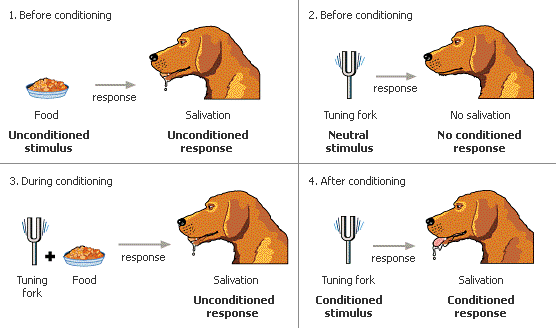Ivan Pavlov's
conditioning experiments on dogs
After the completion of some two years of studies in Germany (1884-1886) he returned to St. Petersburg taking up a junior post in Physiology at the University. In or around 1890 he was appointed to a professorship of Pharmacology in the Institute of Experimental Medicine at St Petersburg. In this role he also functioned as the head of the Physiology department.
Whilst Ivan Pavlov was involved with physiological researches with dogs for several years it was only in or or around 1889 that his famous dog research experiments with reflex conditioning or classical conditioning were begun. These experiments were subsequently continued over thirty years.
In 1904 Ivan Pavlov was awarded a Nobel prize in Physiology and Medicine in relation to his researches in the area of digestive processes. He had become interested in the relationship between salivation and the digestive process. Quite apart from finding that saliva was of the first importance as an aid to digestion he also noticed that dogs that had been familiarised with the pre-feeding routines in his research facility began to salivate apparently in association with certain pre-feeding routines being initiated.
In order to explicitly validate his observations he began to feed his dogs in association with the ringing of a bell. After a certain time the dogs were shown to salivate profusely in association with the ringing bell where the actual sight or smell of food was not also present. Pavlov regarded this salivation as being a conditioned reflex and designated the process by which the dogs had picked up this reflex classical conditioning.

Despite seeming to have been personally opposed to Communism his fame was such that the Soviet government built a specialist research laboratory to accomodate his studies in 1935. It happened however that Ivan Pavlov did not derive much benefit from this new facility as he passed on in 1936.
